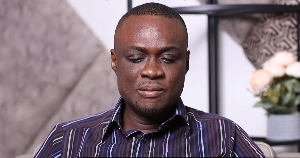In our series of letters from African journalists, Ghanaian writer Elizabeth Ohene, a member of the main opposition NPP, explains the hidden meanings of election parables.
We are in the midst of an election campaign here in Ghana - heading towards 7 December when we elect a new parliament and a new president.
We might not be attracting the same attention from the world as the US one did, but ours is no less interesting.
Over here, we campaign in parables. Not for us the straight talking and almost violent language that characterised the American campaign.
At the moment, however, like the rest of the world, we are trying to come to terms with President-elect Donald Trump. Since the US results, attempts are being made to draw parallels between our two countries. Some people are invoking symmetry.
Since the first elections in our fourth republic in 1992, every time the Democrats have won in the US, the National Democratic Congress (NDC) won here and when the Republicans have won in the US, the New Patriotic Party (NPP) - who also have an elephant as their party symbol - have won here.
So the question is being asked: Does a Republican win in the US mean an NPP win in Ghana?
Since 1992, the NDC has served four terms in office under three presidents and the NPP, two terms under one president
But before we actually vote, the big problem we face right now is trying to understand what people mean when they speak during this political season.
In the scheme of things here, the traditional chiefs are not allowed to participate in active party politics.
They therefore, tend to speak in parables and use a lot of proverbs when they meet with the political leaders.
It is now a full-time undertaking trying to decipher exactly what a chief means when he talks in public.
Brides and suitors
Probably, one of the most colourful bits of language came in the Volta region recently when one of the leading chiefs of the area spoke to an opposition party leader.
A little background here would be useful for the uninitiated of the local politics.
The Volta region has always voted solidly for the NDC, the ruling party; so much so that the region has been named the "World Bank of the NDC".
Everybody's ears picked up therefore, this leading chief moved from the banking analogy and said: "The Volta region is a beautiful bride, waiting for the best suitor."
In other words, the chief was asserting that the Volta region did not have a commitment to any political party.
He went further to say that the Volta region was not "that loyal housewife whose husband only came home when he was hungry".
The interpreters quickly went to work to decipher what the chief meant.
It was generally agreed that the chief was sending a message to the NDC that the Volta region was no longer their reliable stronghold and they resented being courted only during elections.
I tried to make my own interpretation: If the region was a beautiful maiden on the lookout for the best suitor, then there couldn't be any loyal housewife or husbands coming home only when they are hungry.
So was the region unattached and on the singles market? Or had there been a divorce?
The reaction of the NDC has been swift.
"We shall work to deepen our husband and wife relationship," the chief of staff at the presidency went to tell the chiefs in the region.
In other words, hands off all would be suitors, there might be some tensions between us, but this is a marriage we intend to keep.
NDC candidate: John Dramani Mahama, 57
Vice-president under President John Atta Mills, who died in 2012. Completed his term
Now seeking re-election after serving his first term of four years Political pedigree: His father was first minister of state for the Northern region
NPP candidate: Nana Addo Dankwa Akufo-Addo, 72
Campaigned for a return to multi-party democracy under military rule A former justice and foreign minister in the NPP government from 2001 to 2007, he is running for president for a third time
Political pedigree: His father was a prominent politician who served as chief justice and ceremonial president
On another occasion, John Dramani Mahama, the president of the republic, visited another eminent chief in the Volta region and enumerated all the great things he had done and why he deserved a second term.
The chief said he and his people would much rather deal with "the devil they know, than the angel they did not know".
The interpreters decided that "the devil they know" was the president and "the angel they did not know" was the presidential candidate of the main opposition party, Nana Addo Dankwa Akufo-Addo.
The president left the palace a happy man and the elders of the chief were left scratching their heads when the opposition candidate came calling a week later.
Sometimes we run out of suitable proverbs and parables.
I am so looking forward to December 7 when we vote: There shall be no room for interpretation and/or misinterpretation.
The ballot paper has no room for parables or proverbs.
I have a feeling whatever results we get, there will be interpretations using the Donald Trump/Hillary Clinton analogy.
Maybe we should change our voting date and year to get out of the American voting cycle.
We have enough of our own proverbs and parables, not to need to add the American drama.
Opinions of Monday, 21 November 2016
Columnist: bbc.com















